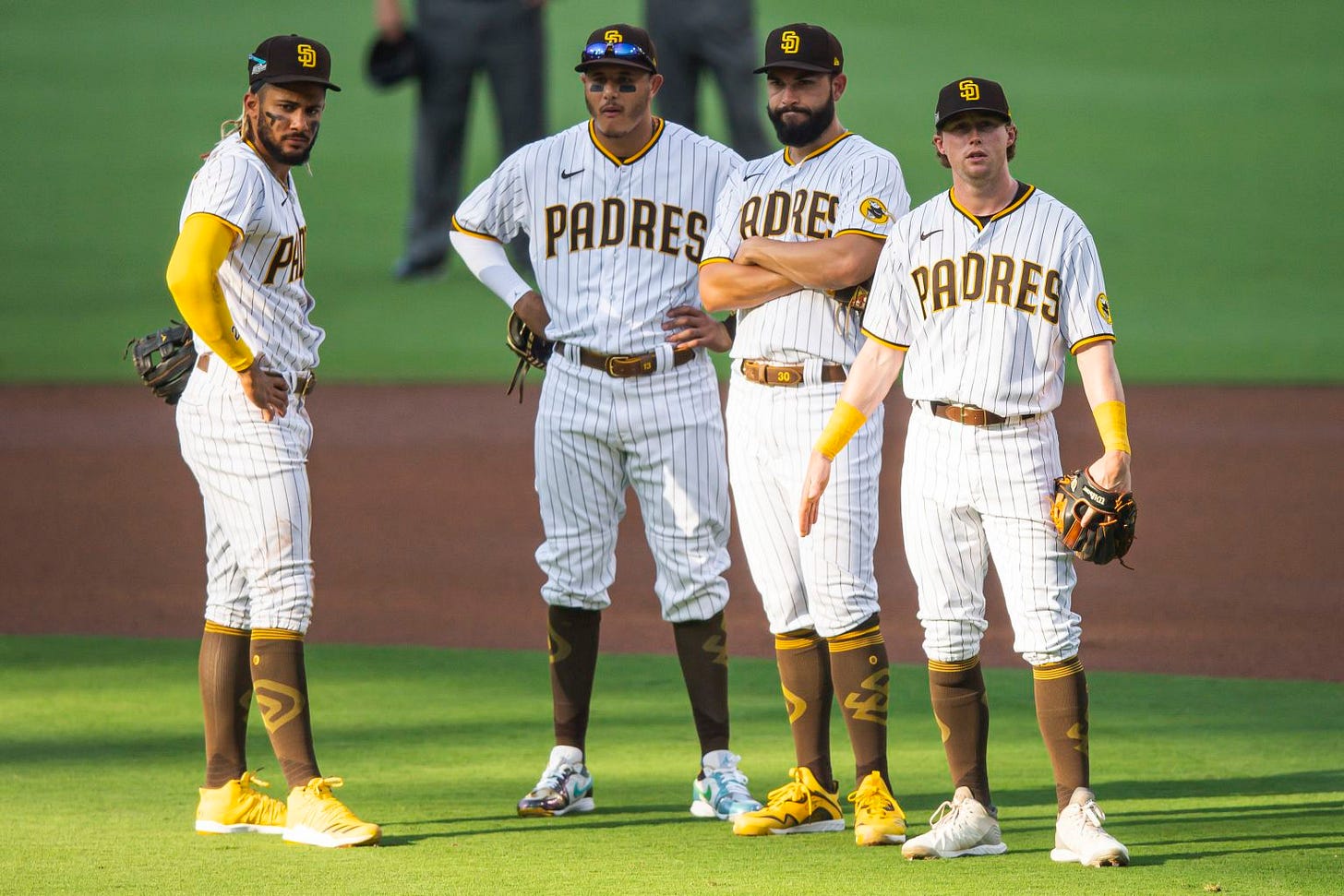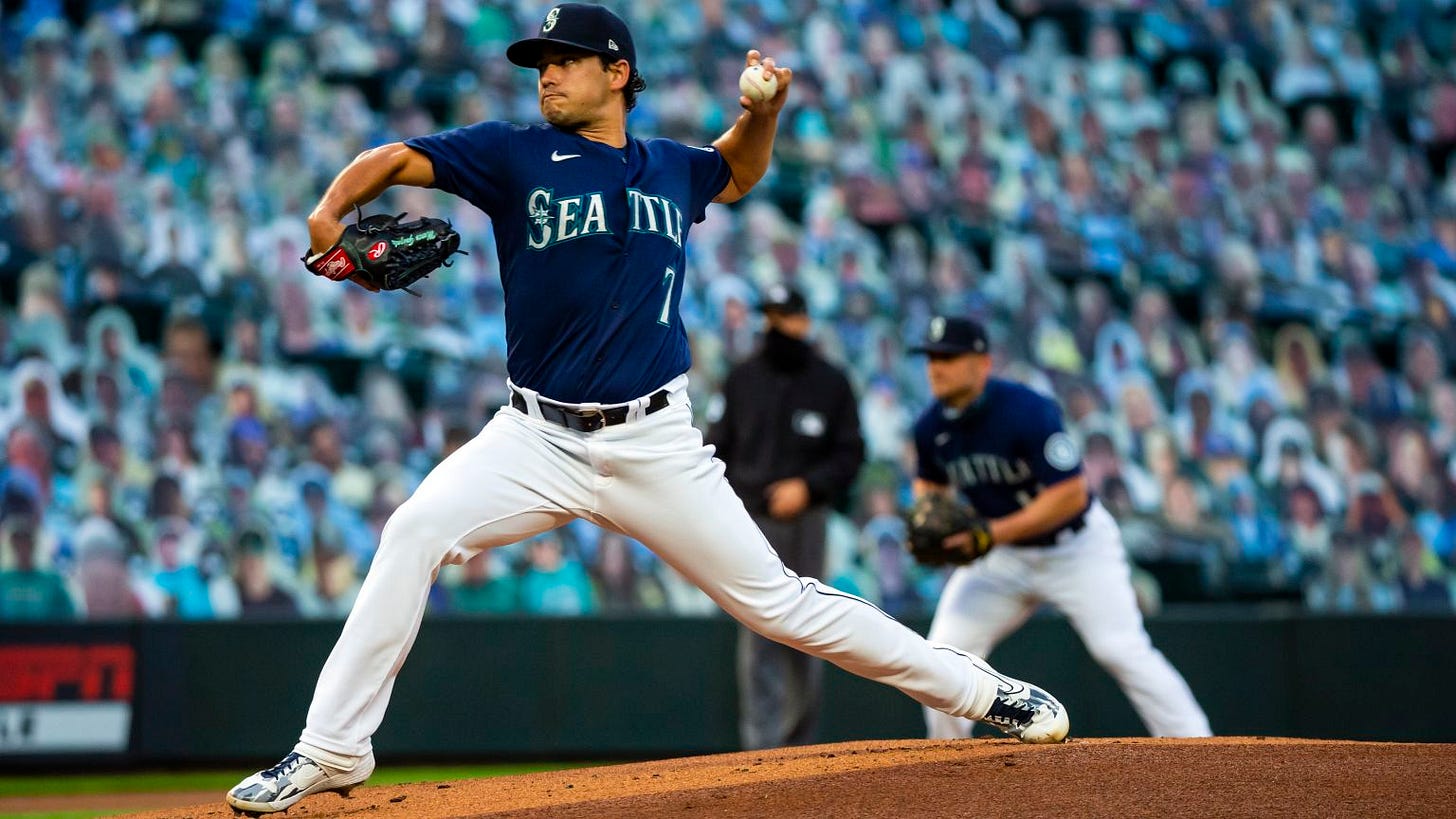The Game Away From The Game
Pitchers and catchers have reported, but the reporting is still focused on off-field matters
The recipe for the first week of Spring Training should be equal parts exciting and boring. There’s the joy that comes from the renewal of the game — seeing players back in uniform, pitchers on the mound, offseason acquisitions in new colors. There’s also the mundane nature of the activities — stretching and warmup exercises, pitchers fielding practice, otherwise routine bullpen sessions now assigned great significance.
Most workouts in February don’t last much beyond lunch. That leaves a lot of time in the day for golf, for roaming the local mall, and for off-the-field news.
The $570 million left side
Fernando Tatis Jr.’s $340 million extension became official this week, and the Padres will roll out a left side of the infield that carries a guaranteed remaining combined base salary of $570 million.
If everything goes as planned, when Tatis and Manny Machado take the field at Petco Park on April 1 against the D-backs, it will be the first time in the history of the Padres franchise that the same pair of players will have started three consecutive Opening Days at shortstop and third base.
Between 2012-2018, the Padres featured six different Opening Day shortstops and five different third basemen.
Padres fans have good reason to be more excited than ever. The Machado and Tatis contracts signal a never-before-seen commitment in San Diego. It’s a bold play at a time when few teams are spending, and it raises questions about the long-term value of the franchise and the Padres’ position as a small-market team.

Deals like these do not get done without the blessing and strong input of ownership.
The failed sale of the Padres from John Moores to a group led by Jeff Moorad was for an estimated price of $525 million. Jim Crane bought the Houston Astros for $615 million in 2011. Ray Davis paid $593 million for the Texas Rangers in 2010. When you pool Machado and Tatis’ future financial resources, it’s not far off; which is to say, nine-figure guarantees are franchise decisions.
Two winters ago, when Machado and Bryce Harper were both on the market, I wondered what could compel one team to sign both players and instantly transform their lineup. The Padres have done one better.
They evaluated correctly, signed the better of the two marquis options, and locked up their franchise shortstop to boot.
But geography and current revenue models remain a problem. As long as the Pacific Ocean borders San Diego to the west, and Mexico lies only about 15 miles south of Petco Park, while Angels territory sits about 60 miles to the north with expansive desert to the east, the Padres will be a small-market team. The team’s local reach is limited, and media deals have always reflected that.
The economic strains caused by the pandemic and the uncertainty that lies ahead has triggered league-wide austerity. So, with the Tatis extension, what message does Padres owner Peter Seidler send to all of Major League Baseball, from players to owners, from corporate sponsors to fans, particularly to supporters of teams whose owners push a narrative of significant recent financial loss? If it were Steven Cohen signing the checks, it’d be more explainable.
But the small-market Pads? Seidler is all in. No other ownership group outside major markets is making this kind of commitment. Even some in major markets are eschewing such spending. So what’s the secret? What does Seidler know that no one else knows?
For one, he has correctly identified an open window of contention. This Padres club is ready to win. Win it all.
“There’s nothing we can’t do,” Seidler said at the Tatis press conference earlier in the week.
Tatis’ contract is structured so that the most expensive seasons don’t begin until 2029, the year after Machado’s contract expires. Tatis will draw a base salary of $36 million annually from 2029 through the expiration of the agreement in 2034. It may not be the kind of payroll flexibility other teams speak of, but the deal does leave potential financial burdens more evenly distributed.
The Padres drew 3 million fans only once, in 2004 when Petco Park opened. They drew almost 2.4 million in 2019. Clearly, Seidler and the Padres are looking beyond the 2021 season, and they envision a day when 40,000-plus fans on most days is both allowed and possible/probable. There are a lot more tickets to sell, and they will likely need to be sold in order to cover future commitments and drive up the value of the franchise.
Machado and Tatis — plus the winning culture they’re expected to help deliver— are the investment that could make Seidler a significant amount of money one day when he decides to sell.
But let’s stay in the moment right now.
How did this big league relationship with Tatis begin? He impressed everyone in 2019 Spring Training, and teammates publicly campaigned for him to make the Opening Day roster. The industry didn’t expect that to happen. After all, his clock would start immediately and the Padres would lose a valuable extra year of control.
Well, Tatis made the club out of Spring Training because he earned it. In turn, General Manager A.J. Preller and the rest of his staff earned immense respect from the clubhouse. The best man for the job got the job. There were no service time gimmicks, no artificial minor league plate appearance thresholds referenced.
So, about that extra year of control…
You can’t fire me. I quit!
I can’t help but wonder what the long-term ramifications in Seattle and around baseball might be after then-team president Kevin Mather resigned this past Monday as opposed to being fired after his racially insensitive and generally ignorant comments from a Zoom call surfaced.
By accepting his resignation, the Mariners response to Mather’s arrogant and sloppy comments is a passive one. Why not fire him? Why not repudiate his behavior and his words? Well, this is the same organization that promoted him after he, along with two other high-ranking Mariners officials, was accused of inappropriate workplace conduct that led to financial settlements for the complainants.
When M’s chairman and managing partner John Stanton cited “the accumulation of all the comments” and not “one individual comment” that did the damage, he exposed — or reminded many of — his own ignorance.
A $75,000-a-year interpreter might not have been the hill worth dying on, but — to Mather’s credit — he found an entire mountain chain where he’d make his last stand.
Racist musings and thinly veiled attacks on the homeless around the ballpark were the worst offenses. Overt admissions of service time suppression is the most damning — and the issue that will persist long after sensitivity training coursework has concluded.

The Mariners baseball operations team, led by GM Jerry Dipoto, has overhauled the team, enduring years of losing to rebuild with intention and direction. I don’t think the embarrassing behavior of the team president will at all impact the on-field product. Suggesting it may is to believe that the business operations side of a sports team has greater reach than it actually does.
Mascots do not negotiate contracts, scout and develop players, or execute deadline deals. No Moose, no Dinosaur, no bird of any color is scoring from first on a double in the gap.
I suspect that the Mariners clubhouse will be drama-free well before the Yankees settle any existing tensions over the return of Domingo German.
“Sometimes you don’t get to control who your teammates are,” said Yankees reliever Zack Britton when asked about German’s return from a suspension related to domestic violence.
For the Mariners, the distraction came from someone with no clubhouse role, and certainly not from someone who will be asked to pitch out of a jam late in close game. No Mariners players have to takes sides, and the manager won’t have to label it a matter that was handled “privately.”
While the incident in Seattle has the potential to galvanize the club, the lingering tensions in the Yankees clubhouse — a clubhouse that includes Aroldis Chapman, the first player ever to be suspended under MLB’s domestic violence policy — may head back north with them in a month.
Thank you for reading Warning Track Power. I realized last week that a lot of newsletters are sent on Thursdays. So this week, let’s try Saturday instead. Subscribe now to have WTP delivered to your inbox every Thursday.
